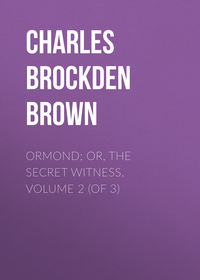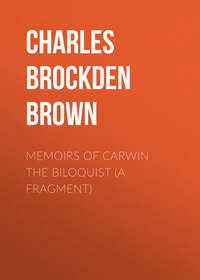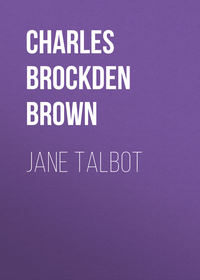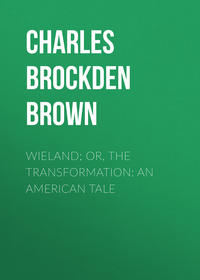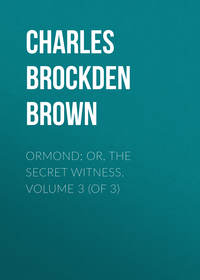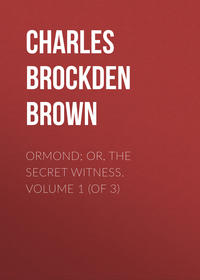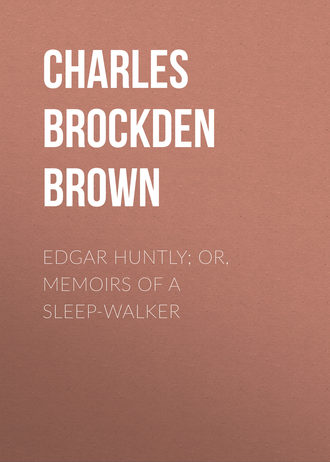 полная версия
полная версияEdgar Huntly; or, Memoirs of a Sleep-Walker
I embraced this scheme, which was thus suggested, with eagerness. I threw myself with headlong speed down the hill and pursued my way to the elm. As I approached the tree, my palpitations increased, though my pace slackened. I looked forward with an anxious glance. The trunk of the tree was hidden in the deepest shade. I advanced close up to it. No one was visible, but I was not discouraged. The hour of his coming was, perhaps, not arrived. I took my station at a small distance, beside a fence, on the right hand.
An hour elapsed before my eyes lighted on the object of which they were in search. My previous observation had been roving from one quarter to another. At last, it dwelt upon the tree. The person whom I before described was seated on the ground. I had not perceived him before, and the means by which he placed himself in this situation had escaped my notice. He seemed like one whom an effort of will, without the exercise of locomotion, had transported hither, or made visible. His state of disarray, and the darkness that shrouded him, prevented me, as before, from distinguishing any peculiarities in his figure or countenance.
I continued watchful and mute. The appearances already described took place on this occasion, except the circumstance of digging in the earth. He sat musing for a while, then burst into sighs and lamentations.
These being exhausted, he rose to depart. He stalked away with a solemn and deliberate pace. I resolved to tread, as closely as possible, in his footsteps, and not to lose sight of him till the termination of his career.
Contrary to my expectation, he went in a direction opposite to that which led to Inglefield's. Presently, he stopped at bars, which he cautiously removed, and, when he had passed through them, as deliberately replaced. He then proceeded along an obscure path, which led across stubble-fields, to a wood. The path continued through the wood, but he quickly struck out of it, and made his way, seemingly at random, through a most perplexing undergrowth of bushes and briers.
I was, at first, fearful that the noise which I made behind him, in trampling down the thicket, would alarm him; but he regarded it not. The way that he had selected was always difficult: sometimes considerable force was requisite to beat down obstacles; sometimes it led into a deep glen, the sides of which were so steep as scarcely to afford a footing; sometimes into fens, from which some exertions were necessary to extricate the feet, and sometimes through rivulets, of which the water rose to the middle.
For some time I felt no abatement of my speed or my resolution. I thought I might proceed, without fear, through brakes and dells which my guide was able to penetrate. He was perpetually changing his direction. I could form no just opinion as to my situation or distance from the place at which we had set out.
I began at length to be weary. A suspicion, likewise, suggested itself to my mind, whether my guide did not perceive that he was followed, and thus prolonged his journey in order to fatigue or elude his pursuer. I was determined, however, to baffle his design. Though the air was frosty, my limbs were bedewed with sweat and my joints were relaxed with toil, but I was obstinately bent upon proceeding.
At length a new idea occurred to me. On finding me indefatigable in pursuit, this person might resort to more atrocious methods of concealment. But what had I to fear? It was sufficient to be upon my guard. Man to man, I needed not to dread his encounter.
We at last arrived at the verge of a considerable precipice. He kept along the edge. From this height, a dreary vale was discoverable, embarrassed with the leafless stocks of bushes, and encumbered with rugged and pointed rocks. This scene reminded me of my situation. The desert tract called Norwalk, which I have often mentioned to you, my curiosity had formerly induced me to traverse in various directions. It was in the highest degree rugged, picturesque, and wild. This vale, though I had never before viewed it by the glimpses of the moon, suggested the belief that I had visited it before. Such a one I knew belonged to this uncultivated region. If this opinion were true, we were at no inconsiderable distance from Inglefield's habitation. "Where," said I, "is this singular career to terminate?"
Though occupied with these reflections, I did not slacken my pursuit. The stranger kept along the verge of the cliff, which gradually declined till it terminated in the valley. He then plunged into its deepest thickets. In a quarter of an hour he stopped under a projecture of the rock which formed the opposite side of the vale. He then proceeded to remove the stalks, which, as I immediately perceived, concealed the mouth of a cavern. He plunged into the darkness, and in a few moments his steps were heard no more.
Hitherto my courage had supported me, but here it failed. Was this person an assassin, who was acquainted with the windings of the grotto, and who would take advantage of the dark to execute his vengeance upon me, who had dared to pursue him to these forlorn retreats? or was he maniac, or walker in his sleep? Whichever supposition were true, it would be rash in me to follow him. Besides, he could not long remain in these darksome recesses, unless some fatal accident should overtake him.
I seated myself at the mouth of the cave, determined patiently to wait till he should think proper to emerge. This opportunity of rest was exceedingly acceptable after so toilsome a pilgrimage. My pulse began to beat more slowly, and the moisture that incommoded me ceased to flow. The coolness, which for a little time was delicious, presently increased to shivering, and I found it necessary to change my posture, in order to preserve my blood from congealing.
After I had formed a path before the cavern's mouth, by the removal of obstructions, I employed myself in walking to and fro. In this situation I saw the moon gradually decline to the horizon, and, at length, disappear. I marked the deepenings of the shade, and the mutations which every object successively underwent. The vale was narrow, and hemmed in on all sides by lofty and precipitous cliffs. The gloom deepened as the moon declined, and the faintness of starlight was all that preserved my senses from being useless to my own guidance.
I drew nearer the cleft at which this mysterious personage had entered. I stretched my hands before it, determined that he should not emerge from his den without my notice. His steps would, necessarily, communicate the tidings of his approach. He could not move without a noise which would be echoed to, on all sides, by the abruptness by which this valley was surrounded. Here, then, I continued till the day began to dawn, in momentary expectation of the stranger's reappearance.
My attention was at length excited by a sound that seemed to issue from the cave. I imagined that the sleeper was returning, and prepared therefore to seize him. I blamed myself for neglecting the opportunities that had already been afforded, and was determined that another should not escape. My eyes were fixed upon the entrance. The rustling increased, and presently an animal leaped forth, of what kind I was unable to discover. Heart-struck by this disappointment, but not discouraged, I continued to watch, but in vain. The day was advancing apace. At length the sun arose, and its beams glistened on the edges of the cliffs above, whose sapless stalks and rugged masses were covered with hoarfrost. I began to despair of success, but was unwilling to depart until it was no longer possible to hope for the return of this extraordinary personage. Whether he had been swallowed up by some of the abysses of this grotto, or lurked near the entrance, waiting my departure, or had made his exit at another and distant aperture, was unknown to me.
Exhausted and discouraged, I prepared, at length, to return. It was easy to find my way out of this wilderness by going forward in one direction, regardless of impediments and cross-paths. My absence I believed to have occasioned no alarm to my family, since they knew not of my intention to spend the night abroad. Thus unsatisfactorily terminated this night's adventures.
Chapter III
The ensuing day was spent partly in sleep, and partly in languor and disquietude. I incessantly ruminated on the incidents of the last night. The scheme that I had formed was defeated. Was it likely that this unknown person would repeat his midnight visits to the elm? If he did, and could again be discovered, should I resolve to undertake a new pursuit, which might terminate abortively, or in some signal disaster? But what proof had I that the same route would be taken, and that he would again inter himself alive in the same spot? Or, if he did, since his reappearance would sufficiently prove that the cavern was not dangerous, and that he who should adventure in might hope to come out again in safety, why not enter it after him? What could be the inducements of this person to betake himself to subterranean retreats? The basis of all this region is limestone; a substance that eminently abounds in rifts and cavities. These, by the gradual decay of their cementing parts, frequently make their appearance in spots where they might have been least expected. My attention has often been excited by the hollow sound which was produced by my casual footsteps, and which showed me that I trod upon the roof of caverns. A mountain-cave and the rumbling of an unseen torrent are appendages of this scene, dear to my youthful imagination. Many of romantic structure were found within the precincts of Norwalk.
These I had industriously sought out; but this had hitherto escaped my observation, and I formed the resolution of some time exploring it. At present I determined to revisit the elm, and dig in the spot where this person had been employed in a similar way. It might be that something was here deposited which might exhibit this transaction in a new light. At the suitable hour, on the ensuing night, I took my former stand. The person again appeared. My intention to dig was to be carried into effect on condition of his absence, and was, consequently, frustrated.
Instead of rushing on him, and breaking at once the spell by which his senses were bound, I concluded, contrary to my first design, to wait his departure, and allow myself to be conducted whithersoever he pleased. The track into which he now led me was different from the former one. It was a maze, oblique, circuitous, upward and downward, in a degree which only could take place in a region so remarkably irregular in surface, so abounding with hillocks and steeps and pits and brooks, as Solesbury. It seemed to be the sole end of his labours to bewilder or fatigue his pursuer, to pierce into the deepest thickets, to plunge into the darkest cavities, to ascend the most difficult heights, and approach the slippery and tremulous verge of the dizziest precipices.
I disdained to be outstripped in this career. All dangers were overlooked, and all difficulties defied. I plunged into obscurities, and clambered over obstacles, from which, in a different state of mind, and with a different object of pursuit, I should have recoiled with invincible timidity. When the scene had passed, I could not review the perils I had undergone without shuddering.
At length my conductor struck into a path which, compared with the ruggedness of that which we had lately trodden, was easy and smooth. This track led us to the skirt of the wilderness, and at no long time we reached an open field, when a dwelling appeared, at a small distance, which I speedily recognised to be that belonging to Inglefield. I now anticipated the fulfilment of my predictions. My conductor directed his steps towards the barn, into which he entered by a small door.
How were my doubts removed! This was no other than Clithero Edny. There was nothing in his appearance incompatible with this conclusion. He and his fellow-servant occupied an apartment in the barn as a lodging-room. This arduous purpose was accomplished, and I retired to the shelter of a neighbouring shed, not so much to repose myself after the fatigues of my extraordinary journey, as to devise further expedients.
Nothing now remained but to take Clithero to task; to repeat to him the observations of the two last nights; to unfold to him my conjectures and suspicions; to convince him of the rectitude of my intentions; and to extort from him a disclosure of all the circumstances connected with the death of Waldegrave which it was in his power to communicate.
In order to obtain a conference, I resolved to invite him to my uncle's to perform a certain piece of work for me under my own eyes. He would, of course, spend the night with us, and in the evening I would take an opportunity of entering into conversation with him.
A period of the deepest deliberation was necessary to qualify myself for performing suitably my part in this projected interview. I attended to the feelings that were suggested in this new state of my knowledge. I found reason to confide in my newly-acquired equanimity. "Remorse," said I, "is an ample and proper expiation for all offences. What does vengeance desire but to inflict misery? If misery come, its desires are accomplished. It is only the obdurate and exulting criminal that is worthy of our indignation. It is common for pity to succeed the bitterest suggestions of resentment. If the vengeful mind be delighted with the spectacle of woes of its own contriving, at least its canine hunger is appeased, and thenceforth its hands are inactive."
On the evening of the next day, I paid a visit to Inglefield. I wished to impart to him the discoveries that I had made, and to listen to his reflections on the subject. I likewise desired to obtain all possible information from the family respecting the conduct of Clithero.
My friend received me with his usual kindness. Thou art no stranger to his character; thou knowest with what paternal affection I have ever been regarded by this old man; with what solicitude the wanderings of my reason and my freaks of passion have been noted and corrected by him. Thou knowest his activity to save the life of thy brother, and the hours that have been spent by him in aiding my conjectures as to the cause of his death, and inculcating the lessons of penitence and duty.
The topics which could not but occur at such a meeting were quickly discussed, and I hastily proceeded to that subject which was nearest my heart. I related the adventures of the two preceding nights, and mentioned the inference to which they irresistibly led.
He said that this inference coincided with suspicions he had formed, since our last interview, in consequence of certain communications from his housekeeper. It seems the character of Clithero had, from the first, exercised the inquisitiveness of this old lady. She had carefully marked his musing and melancholy deportment. She had tried innumerable expedients for obtaining a knowledge of his past life, and particularly of his motives for coming to America. These expedients, however profound and addressful, had failed. He took no pains to elude them. He contented himself with turning a deaf ear to all indirect allusions and hints, and, when more explicitly questioned, with simply declaring that he had nothing to communicate worthy of her notice.
During the day he was a sober and diligent workman. His evenings he spent in incommunicative silence. On Sundays, he always rambled away, no one knew whither, and without a companion. I have already observed that he and his fellow-servant occupied the same apartment in the barn. This circumstance was not unattended to by Miss Inglefield. The name of Clithero's companion was Ambrose. This man was copiously interrogated by his mistress, and she found him by no means so refractory as the other.
Ambrose, in his tedious and confused way, related that, soon after Clithero and he had become bedfellows, the former was considerably disturbed by restlessness and talking in his sleep. His discourse was incoherent. It was generally in the tone of expostulation, and appeared to be entreating to be saved from some great injury. Such phrases as these,–"have pity;" "have mercy," were frequently intermingled with groans, and accompanied with weeping. Sometimes he seemed to be holding conferences with some one who was making him considerable offers on condition of his performing some dangerous service. What he said in his own person, and in answer to his imaginary tempter, testified the utmost reluctance.
Ambrose had no curiosity on the subject. As this interruption prevented him at first from sleeping, it was his custom to put an end to the dialogue, by awakening his companion, who betrayed tokens of great alarm and dejection on discovering how he had been employed. He would solicitously inquire what were the words that he had uttered; but Ambrose's report was seldom satisfactory, because he had attended to them but little, and because he grudged every moment in which he was deprived of his accustomed repose.
Whether Clithero had ceased from this practice, or habit had reconciled his companion to the sounds, they no longer occasioned any interruption to his slumber.
No one appeared more shocked than he at the death of Waldegrave. After this event his dejection suddenly increased. This symptom was observed by the family, but none but the housekeeper took the trouble to notice it to him, or build conjectures on the incident. During nights, however, Ambrose experienced a renewal of his ancient disturbances. He remarked that Clithero, one night, had disappeared from his side. Ambrose's range of reflection was extremely narrow. Quickly falling asleep, and finding his companion beside him when he awoke, he dismissed it from his mind.
On several ensuing nights he awakened in like manner, and always found his companion's place empty. The repetition of so strange an incident at length incited him to mention it to Clithero. The latter was confounded at this intelligence. He questioned Ambrose with great anxiety as to the particulars of this event, but he could gain no satisfaction from the stupid inattention of the other. From this time there was a visible augmentation of his sadness. His fits of taciturnity became more obstinate, and a deeper gloom sat upon his brow.
There was one other circumstance, of particular importance, mentioned by the housekeeper. One evening some one on horseback stopped at this gate. He rattled at the gate, with an air of authority, in token of his desire that some one would come from the house. Miss Inglefield was employed in the kitchen, from a window of which she perceived who it was that made the signal. Clithero happened, at the same moment, to be employed near her. She, therefore, desired him to go and see whom the stranger wanted. He laid aside his work and went. The conference lasted above five minutes. The length of it excited in her a faint degree of surprise, inducing her to leave her employment and pay an unintermitted attention to the scene. There was nothing, however, but its duration that rendered it remarkable.
Clithero at length entered, and the traveller proceeded. The countenance of the former betrayed a degree of perturbation which she had never witnessed before. The muscles of his face were distorted and tremulous. He immediately sat down to his work, but he seemed, for some time, to have lost all power over his limbs. He struggled to avoid the sight of the lady, and his gestures, irresolute or misdirected, betokened the deepest dismay. After some time, he recovered, in some degree, his self-possession; but, while the object was viewed through a new medium, and the change existed only in the imagination of the observer, a change was certainly discovered.
These circumstances were related to me by Inglefield and corroborated by his housekeeper. One consequence inevitably flowed from them. The sleep-walker, he who had led me through so devious a tract, was no other than Clithero. There was, likewise, a strong relation between this person and him who stopped at the gate. What was the subject of discourse between them? In answer to Miss Inglefield's interrogatories, he merely said that the traveller inquired whither the road led which, at a small distance forward, struck out of the principal one. Considering the length of the interview, it was not likely that this was the only topic.
My determination to confer with him in private acquired new force from these reflections. Inglefield assented to my proposal. His own affairs would permit the absence of his servant for one day. I saw no necessity for delay, and immediately made my request to Clithero. I was fashioning an implement, I told him, with respect to which I could not wholly depend upon my own skill. I was acquainted with the dexterity of his contrivances, and the neatness of his workmanship. He readily consented to assist me on this occasion. Next day he came. Contrary to my expectation, he prepared to return home in the evening. I urged him to spend the night with us: but no; it was equally convenient, and more agreeable to him, to return.
I was not aware of this resolution. I might, indeed, have foreseen that, being conscious of his infirmity, he would desire to avoid the scrutiny of strangers. I was painfully disconcerted; but it occurred to me, that the best that could be done was to bear him company, and seize some opportunity, during this interval, of effecting my purpose. I told him, that, since he would not remain, I cared not if, for the sake of recreation, and of a much more momentous purpose, I went along with him. He tacitly, and without apparent reluctance, consented to my scheme, and, accordingly, we set off together. This was an awful crisis. The time had now come that was to dissipate my uncertainty. By what means should I introduce a topic so momentous and singular? I had been qualified by no experience for rightly conducting myself on so critical an emergency. My companion preserved a mournful and inviolable silence. He afforded me no opening by which I might reach the point in view. His demeanour was sedate, while I was almost disabled, by the confusion of my thoughts, to utter a word.
It was a dreadful charge that I was about to insinuate. I was to accuse my companion of nothing less than murder. I was to call upon him for an avowal of his guilt. I was to state the ground of my suspicions, and desire him to confute or confirm them. In doing this, I was principally stimulated by an ungovernable curiosity; yet, if I intended not the conferring of a benefit, I did not, at least, purpose the infliction of evil. I persuaded myself that I was able to exclude from my bosom all sanguinary or vengeful impulses; and that, whatever should be the issue of this conversation, my equanimity would be unsubdued.
I revolved various modes of introducing the topic by which my mind was engaged. I passed rapidly from one to another. None of them were sufficiently free from objection to allow me to adopt it. My perplexity became, every moment, more painful, and my ability to extricate myself, less.
In this state of uncertainty, so much time elapsed, that the elm at length appeared in sight. This object had somewhat of a mechanical influence upon me. I stopped short, and seized the arm of my companion. Till this moment, he appeared to have been engrossed by his own reflections, and not to have heeded those emotions which must have been sufficiently conspicuous in my looks.
This action recalled him from his reverie. The first idea that occurred to him, when he had noticed my behaviour, was, that I was assailed by some sudden indisposition.
"What is the matter?" said he, in a tone of anxiety: "are you not well?"
"Yes," replied I,–"perfectly well. But stop a moment; I have something to say to you."
"To me?" answered he, with surprise.
"Yes," said I. "Let us turn down this path," (pointing, at the same time, to that along which I had followed him the preceding night.)
He now partook, in some degree, of my embarrassment.
"Is there any thing particular?" said he, in a doubting accent. There he stopped.
"Something," I answered, "of the highest moment. Go with me down this path. We shall be in less danger of interruption."
He was irresolute and silent, but, seeing me remove the bars and pass through them, he followed me. Nothing more was said till we entered the wood. I trusted to the suggestions of the moment. I had now gone too far to recede, and the necessity that pressed upon me supplied me with words. I continued:–


